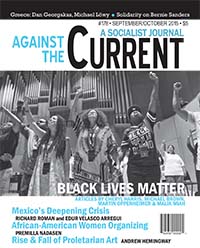Against the Current, No. 178, September/October 2015
-
Poisoned Fruits of Austerity
— The Editors -
Why Black Lives Matter Is Game Change
— Malik Miah -
Household Worker Organizing, Its Lessons for Labor Today
— Premilla Nadasen -
Women Warriors of Montgomery
— Premilla Nadasen -
On Bernie Sanders' Campaign
— a statement by Solidarity - Defend Chelsea Manning!
-
Ontario Teachers Face Austerity Drive
— Peter Brogan -
Capitalism Vs. Democracy in Europe
— Michael Löwy -
Greece, Austerity & Europe's Future
— Dan Georgakas -
Mexico's Deepening Crises
— Richard Roman and Edur Velasco Arregui - Marxism and Art
-
Rise and Fall of "Proletarian Art," Part II
— Andrew Hemingway - Black Lives Matter
-
Introduction to Black Lives Matter
— The Editors -
Making It Visible to Ourselves
— Cheryl Harris -
Neoliberalism and the New Lynching
— Michael Brown -
Racist Terror, Then and Now: Many Ways to Die
— Martin Oppenheimer - Reviews
-
NY Public Workers Under Attack
— Steve Downs -
Slavery and the American Revolution
— Paul Prescod -
Horizons for a New Left
— Michael Principe -
China: Workers Rising?
— Jane Slaughter -
Between the Power and the Dream
— Alan Wald
Premilla Nadasen
THE WOMEN’S POLITICAL Council, a civil rights group founded in Montgomery, had been meeting for years and discussing a possible citywide bus boycott. It had a distributional network in place and was ready to launch such a protest at a moment’s notice. Martin Luther King Jr. would become the primary spokesperson of the yearlong boycott, bringing him to national attention. Less prominent in the boycott’s retelling are the working-class and poor black women who were the grassroots base of the movement, whose voices are often muted. The iconic black maid dutifully supporting the boycott by refusing to ride the buses after a long and exhausting workday is an image closely associated with the national narrative of the boycott. In some ways the representation of the maid in the movement fed popular stereotypes of the loyal black mammy — although in the service of the movement rather than the white family. She is strong but not confrontational; tired but determined, as evidenced in the oft-repeated quote attributed to Mother Pollard, a poor elderly black woman who, when asked if she was tired, replied: “My feets is tired, but my soul is rested.”
In reality, domestic workers played a significant and complicated role in the boycott. They filled the pews at mass meetings and served as the foot soldiers that made the boycott a success, and they also exhibited leadership by raising money and mobilizing others in the community to support the campaign. They used their domestic skills in the service of the protest (by selling food they had cooked to raise funds, for example), and the political leverage they gained from civil rights activism in their day-to-day dealings with their employers. The disruptions of the boycott transformed their relationships with their employers, emboldening the workers and fostering a sense of militancy.
Excerpted from Household Workers Unite: The Untold Story of African American Women Who Built a Movement by Premilla Nadasen (Beacon Press, 2015). Reprinted with permission from Beacon Press.
September-October 2015, ATC 178

